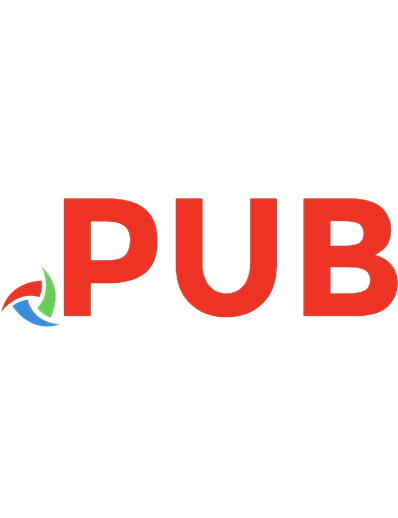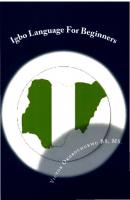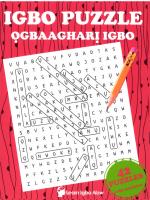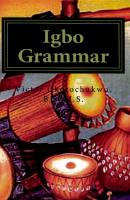Igbo for Learners (a School Text Series) [2]
invalid isbn: 978 - 8117 - 45 - 7B
416 86 50MB
Igbo Pages 77 Year 2008
Polecaj historie
Citation preview
EJIRIKA
IGBO FOR LEARNERS (A SCHOOL TEXT SERIES)
BOOK TWO ,,
by
OKECHUKWU C. IHEJIRIKA
© Okechukwu Ihejidka 2nd Edition 2008
.AP right .reserved. No part of this publication may be reproduced, stored In a retrieval system, or transmitted In any means, elsctronlc, mechanical, photocopying, recording or otherwise, without ths prior permission of the Author and P. C. C. & P. LTD. 978 - 8117 - 4$ - 7B
Published by P.C.C. & P. LTD . . 58 Old Market Road, Onitsha.
Phone:08059895747
CONTENTS Topic
Yunlt
1.0
Nkejlasysy (Parts of Speech) ........ 1 MkPQaha (Noun) ....................................1
1.1
Page
i .o
Usoro Odlde Igbo N''-'zQ Dabara Adaba 21 2.1
Formation of plurals In Igbo ............... 21
2.1.1 NDJ A .................................................. 21 1.2 · NnQChfaha (Pronoun) ............................. 6
2.1.2 1.3
VMV ........................................ ~ ...........• 22
NkQwaaha (Adjective) ............................ 8
2.1.3 NDI ......................................................,22 1.4
Ngwaa (Verb) .........................................9
2.2.0 Possessive AdjectJves ........................... 24 1.5 ' Conjugation of some verbs .................. 15 2.2.1 M (My- 1st Person Singular) ..............24
1.5.1 IHI (To dean) ....................................... 16 1.5.2
ISA (To wash) ...................................... 17
2.2.2
ANYl (OUR -
1st Person Plural) .......... 25
2.2.3 Gf (YOUR- 2nd Person Singular) ....... 25 1.5.3
lSV (To dear/cut) ................................ 17 2.2.4
VNV (YOUR -
2nd Person Plural) ........ 25
1.5.4
lWV {To jump) ..................................... .LS
1.6
Nkwvwa ( Adverb) ................................ 19
2.2.5 YA (HIS, HER, ITS - 3 rd Person Singular) .............................................. 2f
1.7
NjikQ (Conjunction) .............................. 20
Z.2.6 HA (THEIR - 3rd Person Plural) .......... 26
2.3.0 Possesive Pronouns .. ~ ........................... 26
4.0 AgvmagSJ Qny Igbo .............................37
2.4.0 Expressing Negation In Igbo ................ 28
4.1
lfo ·······················~·: ................................. 37 . . - ~
.
3.0
.
2.4.1 Negative Present Continuous Tense .... 28
4.2
2.4.2 Negative Past Tense ............................29
4.3 · AbV Ngwere ... .'......................................40
2.4;3 Negative Future Tense ........................30
4. 4
AbV Egwuregwu .................................. .41
Mmallte Agvmagy E Dere Ede ............ 32 (The beginning of Igbo writte_ n literature)
4.5
Ihe ndl na-efe efe ............................... .43
4.6
Egbe Felite ...........................................44
4.7
Uri .........................................................45
1.1' 3.2
Ag1,1magtii Igbo ............ ·......................... 32 Ejlrimara Agvmagt; e dere ede ........... 33
5.0 3.3
Abv AwQ ...............................................40
Vdl Agvmagv di IChe lche ................... 34
Mmallte Ik9 Ak1,tk9 ..............................46 (Dlreet: and Indirect Speech)
(Different types of literature)
5.1
Quotlng/Repeating oneself .................. 46
3.3.1 Agvmagt,J AkvkQ _(Novel) ................. :.... 34 . 3.3,2 _Agt,Jmagv AbV (p~etry) ........................ 35
3.3.3 Agvmagv Ejljle (Drama) ...................... 35
,.
5.2
Jk9wa
lhe vm\fakw1.1kw9 na-ahv gburugburu vlQakwvkwQ ha .............. 48
6.0 Omenala (Culture) ............................
Qjl (Kolanut) ........................... .
.
..-.-
49
6.2·
Qmv nkwv (Tender palm frond) ......... s~
6.3
~i I
.,,. ••.·:1;..-··
•••• . I
..... ,............
TOPIC 1 KEJ!.ASVSV (PARTS OF SPEECH) n !earning a '1e• language Ii e r~uo, you only need to k.nov th_ words to C- l""lbir. " which will bring out what you have In mind. As a leamer1 .you are bound to make funny meanings. Do not fee.I ashamed or fear to make mistakes. With Interest In the language, and with tJme and frequent attempts, your mlstakes will be corrected and you start speaklng the language well. Even If your friends laugh at you, Ignore them and make more efforts, you will succeed . Whatever words you choose depends upon what you have In mind to say. It may be that you want to make a statement In Igbo, or to request for something or to give a piece of lntorma'tibn or lodge a complaint or just ask a question. You have to know the right words to use and join them correctty to form your sentences. So, your sentence Is made up of words, which you know already that wlll bring out to others what you
groups ot mkpQaha {nouns), nrn;x:hiaha (pronouns), ngwaa (verbs), nkQwaaha (adjectJves), nkwuwa (adv..erbs), nJlk.Q (conjunctions) and others. In this\ topic, therefore, we are going to learn about each ; group of words tnat make up our sentences. We call l them parts of our speech (Nkejiasvsv). After knowing I them, we can form more sentences correctiy on our own ~~ut waitlng for the teacher.
.
Yunlt 1.:1 >
MKPQAHA (NOUN)
MkpQaha bv aha mmadlJ, anvmanv, lhe rna9bv ebe. Aha mmadv dlka: A!Ja, Obi, Ojo, Musa, Amtna,
Okon, Pita, PQI. Aha anvmanv d\k.a: Oke, Ngwere, Agv, Nkita, Nwaologbo, Ewu, At\U\I. ·Aha lhe d\ka: Oche, vzQ, QPV, akvpe, akpa, lgbe, ek.ete, bQQlu.
Aha ebe/obodo dlka: VIQakwvkwQ, ~' fJ\Qakv, have In mind. When you make the sentence or join Lagos, Aba, Abuja, Kano, Ibadan, Uyo, London. the words, your listener Immediately understand you. The words which you are using are selected from
\
.
.
'
MKPQAHA VFQDV Bt)
Epe
Ube Bekee
Okwvrv bekee
Nkwvba
Unere
AyQbasf
Ike nkw!J
JI
2
' .''
l'' ("
Akpa
Okpu
tko
Ite
Efere
Oche
.....
~l
![Igbo for Learners (a School Text Series) [1]](https://dokumen.pub/img/200x200/igbo-for-learners-a-school-text-series-1.jpg)
![Igbo for Learners (a School Text Series) [3]
97881174570](https://dokumen.pub/img/200x200/igbo-for-learners-a-school-text-series-3-97881174570.jpg)








![Igbo for Learners (a School Text Series) [2]](https://dokumen.pub/img/200x200/igbo-for-learners-a-school-text-series-2.jpg)